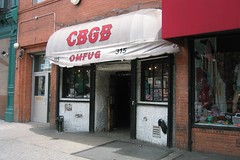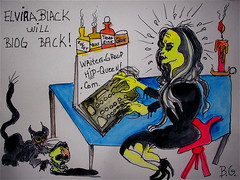Life during wartime
Although the jury may still be out on this, I fervently believe that we are in the stifling death grip of global warming. I remember a time when summers in New York City were mostly bearable, at least until August, but this year the heat wave started in June and shows no signs of dissipating. But what really struck fear in my heart was when the neighboring borough of Queens had a blackout that lasted over a week, and started, as I recall, on a day when the temp rose to over 100 degrees. Businesses lost thousands of dollars and residents were left with no lights, no elevators, no refrigeration, and no air conditioning during a period of virtually unrelenting heat and humidity.
Somehow people survived, but I am left with a feeling of fear and dread about how the rest of the summer may play out. I spend most of my time indoors in air-conditioned comfort, and going out at all makes me feel like I'm going to collapse in a heap. The A/C, the computer, and the TV are my lifelines, and without them I would be lost. Reading, writing, thinking and sleeping would be a thing of the past for me if the power blew out, and I'd be reduced to a miserable, animal-like condition where sheer survival would be the order of the day.
If a power outage can turn normal life upside down, the specter of another terrorist attack and how radically it might affect everyday life is even more--well--terrifying. Although New York City is mostly exempt from hurricanes, tornadoes, mudslides, and devestating floods, since 9/11 it is impossible to deny that the city is vulnerable to another man-made disaster. The vision of what might be is always in the back of my consciousness. It's the kind of realization that makes it hard for me to plan too far in advance or to take for granted that things will not fall apart in the future--perhaps even the near future. And then there's the rest of the war-torn world. If you talk to Newt Gingrich, for example, you will find that he--and undoubtedly others--maintain that we are already in the midst of World War III. And it's not hard to fathom that we are major players--and targets--in this horrific game.
It's at times like these that the Talking Heads' 1979 single "Life During Wartime," from their album Fear of Music, provides the ultimate in irony-tinged musical enjoyment. If memory serves, we were not at war with anyone back then, except perhaps ourselves if one counts the war on crime and the war on drugs. But at the time, the Heads' irresistibly dancable song, with its famous refrain of "This ain't no party/this ain't no disco/this ain't no foolin' around" provided a quintessentially hip soundtrack at countless New York City clubs and parties during an era when the last thing on anyone's mind was the spectre of a terrorist attack. But nowadays, the Heads' rendition of the virtual collapse of life and civilization as we know it seems all too ominous.
Taken out of context of its grim lyrics, "Life During Wartime" is an exhilerating masterpiece culled from one of the chief New York denizens of the sophisticated, inventive, but mostly apolitical post punk era. The relentless, adrenaline fueled beat that makes it so dancable is tempered with a cheesy, off-kilter organ riff, David Byrne's signature whooping yet oddly deadpan vocal style, and bongos and bass which provide a funky counterpoint. But the sobering lyrics, which were once doubtless interpreted as a throwaway, tongue in cheek vignette about an improbable invasion--or perhaps the rantings of a deluded paranoid--hit much closer to home 27 years after the fact.
The lyrics descibe a desperate life and death scenario in which the US has been invaded by some malevolent force--either from without or within--and the battle is raging close to home ("The sound of gunfire, off in the distance, I'm getting used to it now.") The singer is apparently a member of a clandestine resistance movement compelled to operate incognito and at perpectual risk of being discovered ("You oughta know not to stand by the window/Someone might see you up there.")
But what resonates most strongly with me is the Heads' vision of how the "us versus them" dictates of war can erode individuality and culture--by compromising all the material and "frivolous" things that give our lives their essential context and meaning. Byrne depicts a scenario in which his own identity has become so altered that it's vanished altogether ("We dress like students, we dress like housewives/Or in a suit and a tie/I changed my hairstyle so many times now/I don't know what I look like")
Moreover, the cultural touchstones that define us have withered away, becoming superfluous, even disadventageous ("Why stay in college? Why go to night school?...Burned all my notebooks, what good are notebooks?/They won't help me survive.") Even the beloved clubs that defined late '70s New York hipsterdom have been swept away in the chaos ("This ain't no party, this ain't no disco/This ain't no fooling around/This ain't no Mudd Club or CBGB/I ain't got time for that now") (Of course, the Heads played CBGB and Bryne frequented the ultra cool Mudd Club back in the day.)
In a preciently ironic twist on current concerns about privacy issues, Byrne's desperate protagonist finds himself on the other side of the equation ("We got computer, we're tapping phone lines/I know that that ain't allowed.") In this context, the song's unrelentingly frenetic tempo conjures up the frenzied flight of a refugee in his own land ("Trouble in transit, got through the roadblock/We blended in with the crowd.")
As a coddled American, my concern about power outages may seem laughable compared to the horrors that have overtaken other parts of the world as the result of war and its resultant chaos and oppression. The Islamic jihad against the Western way of life is a cultural and ideological war as much as anything else--a disgust with and rejection of our unfettered expression of individuality. The maniacal hordes who perceived a mere cartoon as a challenge to the death amply illustrate that such regimes are not interested in parties, discos, night school, or notebooks. Culture and free thought have been exterminated, and such fundamentalist regimes view us as literally demonic. As the most recent example, the relative cultural sophistication heretofore enjoyed in Lebanon has literally and figuratively been blown to bits by the cancer of Hezbollah and the country's tragic status as an unremitting war zone. Totalitarian and terrorist regimes cannot tolerate the free flowering of culture and civilization--as Hitler's war on "degenerate art" made plain. To wit, tyranny can not only destroy life, but everything that makes life worth living.
It's easy for me to sit in air conditioned comfort and mull over lyrics to a song from a more carefree time when the spectre of war in our own country could only have been perceived as a playful fantasy. In that more peaceful era, Byrne's lament that he "ain't got no speakers, ain't got no headphones/Aint' got no records to play" could be viewed as nothing more than an artful turn of phrase. Indeed, on the surface, "Life During Wartime" is still eminently danceable and joyous, but the underlying message it conveys seems deadly serious decades after the Heads' quirky, seemingly absurd vision was brought to life.




